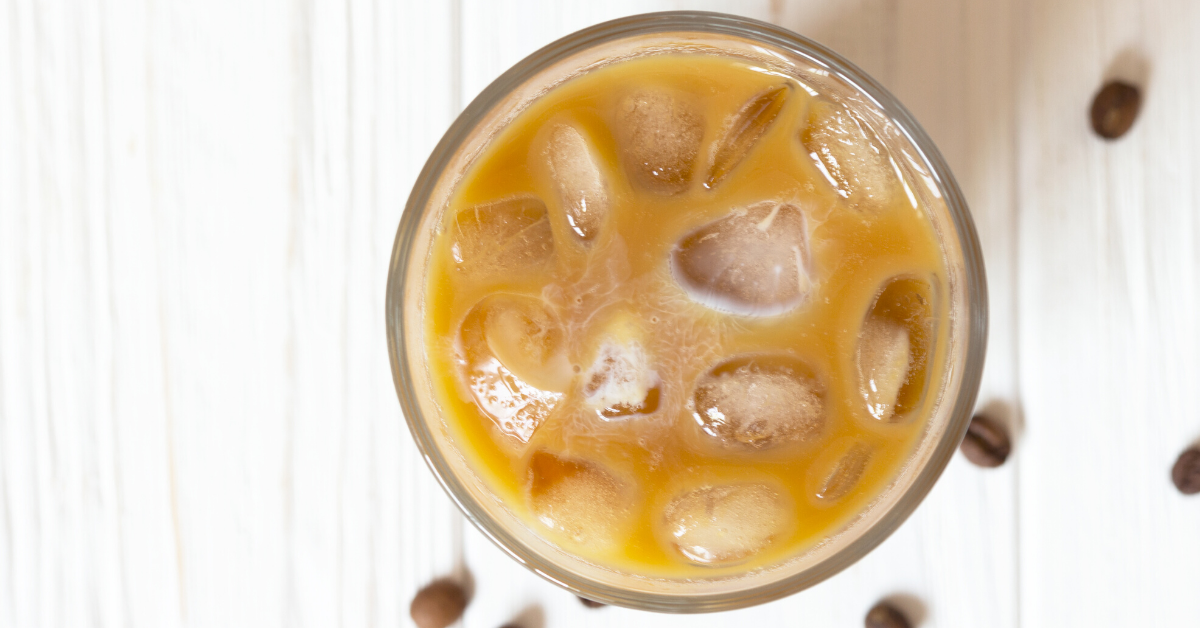
I used to spend too much money on coffee. Now that I'm making it at home more, I find myself enjoying both the flavors and the savings more. Try this at home!
Coffee is sometimes considered a diabetes problem food. When you get coffee at a coffee shop you are usually getting a lot of added sugars. Even if you're drinking it black, the caffeine alone from this virtually zero-carb beverage can raise your blood sugar. But that doesn't mean you cannot drink it. Use your glucometer to find out how coffee affects your blood sugar and figure out how to minimize any blood sugar spikes you may experience.
Now that I'm making coffee at home more often, I've been discovering ways to get the same enjoyment I sometimes miss from coffee shops. While drinking coffee black is my go-to, sometimes I just want some fun flavors. One way I've really enjoyed it is to make an iced latte without added sugars. Here's how.
Ingredients
- 2 cups brewed coffee (for best results, make espresso roast and brew it longer)
- 1½ cups milk (choose a type of milk that works with your eating plan)
- 2 tbsp sugar-free flavoring (my favorite is salted caramel from Jordan's Skinny Mixes)
Optional: Whipped topping and ground espresso beans
Directions
First, brew your coffee. Then, transform into your favorite barista. Here are my favorite methods:
- Cold brew! Measure out your ground coffee and water ratio. Put it all in a french press, cover with cellophane, and let it just sit for 12 hours before you're ready to make your iced coffee. Because of the missing heat, cold brewing will give you a less acidic coffee as well as less caffeine. Very refreshing!
- Espresso. If your coffee maker has the setting option, make a nice espresso. It's good and heavy, and will really wake you up! You'll get a very full, pure coffee flavor to mix into your latte. If you don't have that setting, you can usually find a good stovetop espresso maker, like I did. After the coffee is made, allow it to cool completely.
Next, in a pitcher, combine coffee, milk, and flavoring and stir. For best results, refrigerate for a while to let it get cold.
Finally, put it all together. Put ice in a few glasses and pour the coffee mixture evenly.
Sometimes I like to add some whipped topping and a dusting of finely ground espresso beans on top for that extra zing. You can also try nutmeg, cinnamon, or cocoa to mix things up.
Remember, you can trade out ingredients to make your own creation. But here is a good place to start. Enjoy!
Guide to Coffee with Diabetes
About all that coffee and caffeine…
Did you know that people have been drinking coffee since the 1400s and it is now one of the most popular drinks in the world? In fact, coffee is only second to petroleum as the most commonly traded commodity in the world! Knowing this, it’s not surprising that you can get a cup of coffee almost anywhere.
Why do we love coffee so much?
One of the main reasons is probably caffeine, which is a natural stimulant found in over 70 plants, with coffee beans and tea leaves probably the most popular sources.
Scientifically speaking, caffeine blocks a chemical called adenosine in your body that makes you feel sleepy. That’s why you feel more awake, energetic, or alert when you consume caffeinated drinks.
Another reason coffee is so popular is it is often a social experience. People meet to drink coffee together at cafes, office buildings, and homes.
The average person drinks about two 8-ounce cups of coffee a day. This much coffee gives you a little under 200 milligrams caffeine.
Is caffeine good for you?
Caffeine has quite a complex reputation. Some studies say it is good for you, some say it is not so good for you (usually paired with “when consumed in high amounts”).
Some studies even say that drinking coffee could reduce your risk of type 2 diabetes (whether it is caffeinated or not).
Some study findings about coffee we find particularly interesting:
-
The National Institute of Health found in 2012 that higher coffee consumption was associated with a longer life span. Well, that’s certainly a good finding, especially if you like coffee!
-
Another study found that drinking moderate amounts of coffee (3-5 cups) is associated with reduced risk of cardiovascular disease; but higher amounts of coffee (more than 5 cups) is associated with an increased risk of cardiovascular disease!
-
Like cardiovascular disease, studies show different outcomes for hypertension depending on how much coffee you drink. Moderate amounts of coffee consumption (1-2 cups) had no effect on hypertension, and three or more cups a day was associated with reduced risk of hypertension!
Caffeine affects our bodies depending on how much we drink and any underlying health conditions we may or may not have. As with all things, moderation is the key!
What about coffee/caffeine and its potential effects on people living with diabetes?
According to the Mayo Clinic, young healthy adults don’t see significant changes in their blood sugar by drinking coffee.
If you are living with diabetes, caffeine, like any food, can affect your blood sugar levels. Some people see an increase, some a decrease, and some see no change in their blood sugar at all.
The effect caffeine has on your blood sugar is related to how it affects the hormones in your body. For example, caffeine (a stimulant) increases the release of adrenaline in your body, which raises blood sugar.
As mentioned, use your glucometer to figure out how coffee affects your blood sugar and adjust your consumption accordingly.
Sources:
NCA releases 2020 National Coffee Data Trends, the "Atlas of American Coffee” | NCA USA
9 Reasons Why (the Right Amount of) Coffee Is Good for You | Hopkins Medicine
Mayo Clinic “Caffeine: How much is too much?” | Mayo Clinic
Caffeinated or not, coffee linked with longer life | Harvard

